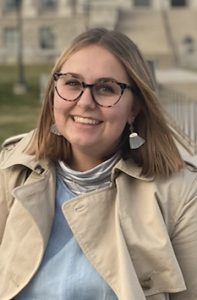Kincart: Learning Not to Judge from the Real Housewives of SLC
The Temple Square and City Creek Shopping Mall sit at the center of winter decoration of the Salt Lake City downtown starting from Thanksgiving and lasting until new year. Photographed on Dec. 31, 2018 (Photo by Abu Asib | The Daily Utah Chronicle)
December 17, 2020
Last year, Andy Cohen announced that the reality TV show “Real Housewives” would be heading to Salt Lake City. To many, myself included, this seemed like an odd choice given the cultural influence of The Church of Jesus Christ of Latter-day Saints on our state and capital city—but that ended up being a focus of the show, which premiered this fall. Bravo TV manages to emphasize Mormonism in every episode of the Salt Lake series.
Because of the way “RHOSLC” has portrayed the church, Deseret News went as far to suggest that members should not watch the show. For those less familiar with the church and Utah culture, these women’s lives might come as a bit of a shock. They don’t live traditional Mormon lifestyles, yet four out of the six women have clear, but wildly different, relationships to the church. As a Utahn, a member of the LDS Church and a lover of reality TV, these relationships have given me a chance to evaluate how I perceive others. Though members of the church may be dissatisfied with the way that “The Real Housewives of Salt Lake City” portrays us, it’s not our place to judge how these women tie themselves to the faith.
One woman on the show, Jen Shah, left the church because of the way it has mistreated Black members, and she converted to her husband’s Islamic faith. She joined “RHOSLC” to prove that it’s “not all blond-haired, blue-eyed girls out here in Utah, that we’ve got some flavor.” Shah, who is Hawaiian and Tongan, was constantly mistaken as Black while growing up in Salt Lake City. She uses her platform on the show to open up about the racism her family has encountered in Salt Lake. I sympathize with Shah’s concerns. The church has mistreated Black members in systematic ways. Leaders didn’t even allow Black men into the church’s priesthood until 1978. Shah’s Black husband and their sons’ experiences have shaped her ties to the religion — and they are completely valid. Similarly, the racism her family has experienced in Utah is real and it is important that she addresses it on the show. By acknowledging the injustices imposed by the church and Utah culture, Shah is actually moving Utahns toward a more just future.
Another woman on the show, Heather Gay, is a graduate of Brigham Young University. She’s a self-proclaimed “good Mormon gone bad” whose divorce complicates her relationship with the church. In the third episode of “Real Housewives,” Gay opens up about the pressures of perfection she felt while in her marriage and raising a family. She attributed these pressures to being a member of the church. That sense of overwhelm and underachievement — in everything all the way down to a woman’s appearance — makes perfect sense in light of the fact that Utah employs more plastic surgeons per capita than Los Angeles. Gay’s breakdown on the show demonstrates vulnerability in grappling with the expectations of being a mother and wife in the church. It gives members a chance to evaluate their roles in perpetuating this toxic culture. Although members can’t change the church’s doctrine on marriage and family, we should change how we contribute to the attitudes surrounding it.
Lisa Barlow also attended Brigham Young University. A self-described “Mormon 2.0,” Barlow owns a tequila brand. She is quoted saying, “I love my business and I like my religion, too. It’s about being a good person and doing good things for people.” This is the exact openminded and accepting approach members of the church should take while watching the show. In Episode 3, she quizzes her son on the Ten Commandments and drinks a Diet Coke — actions more typically associated with Mormon culture. Although Lisa’s business ventures might be unusual for an LDS woman, she embodies the typical Mormon mom in terms of her love for Diet Coke alone. Even if we struggle to understand Lisa’s relationship to her faith, she still feels connected — and that’s the most important part. It’s not our place, as viewers or members of the church, to evaluate such a personal relationship.
I watch the “RHOSLC” nearly every Wednesday and find a lot of truth in its portrayals of religion. I’m not saying the show or the women it follows are perfect — gross displays of wealth, unethical fashion and selfish drama are obviously problematic. But “RHOSLC” gives us an opportunity to respect and empathize with the personal and unique relationships that Utah women have with Mormonism. Let’s abandon the toxic expectations to which we hold Mormon women and embrace an attitude of acceptance as we interact with our neighbors, friends and family members.









Chris Vore • Dec 17, 2020 at 10:12 pm
I all about people keeping ties to the Church of Jesus Christ of Latter-day Saints. After all, there’s a much better chance of it rubbing off on each of us including the awful display of humanity on the show.